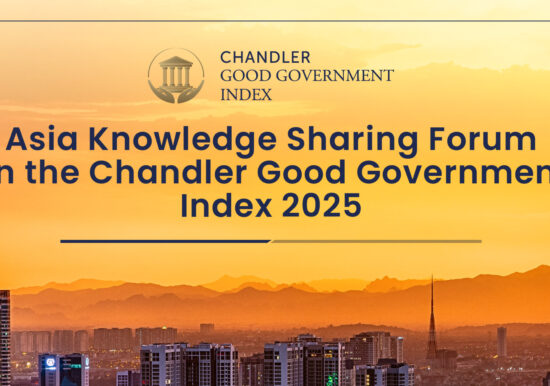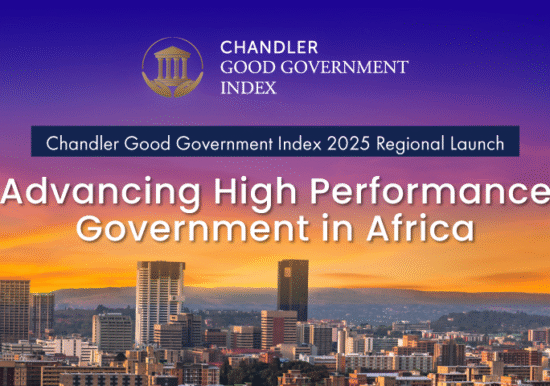
Ireland: Reaffirming Core Values in a Changing World
Ethical Leadership and Values-Driven Policymaking Matter to Good Governance
Ethical Leadership, ”the control and prevention of the abuse of public power for private benefit”, is a foundation of good governance. It helps prevent corruption, sets a powerful example for others to follow, builds trust, creates accountability, and fosters inclusion. But this would be difficult to accomplish without the Robust Laws & Policies that institutionalise and enforce these values. CGGI data seeks to examine which countries seem to be excelling at governing and regulating in a values-driven, trust-based, people-centred way. How are these countries creating an environment in which such values and principles can thrive? We take a closer look at Ireland, a country that stands out not only for its performance in the CGGI 2024, but also its sustained progress since the Index was created.
IRELAND’S PERFORMANCE IN THE CGGI 2024
Ireland ranks 10th overall in the CGGI 2024. The country has made steady progress since 2021 in both the Ethical Leadership indicator and across the Robust Laws & Policies pillar. The CGGI uses data from Transparency International’s Corruption Perception Index—where, in 2022, Ireland ranked 10th out of 180 countries.1 Since 2017, almost every single country in Europe has seen anti-corruption scores stagnate or decline—but Ireland was the only country to ”significantly improve”.2 A similar trend appears in the 2023 World Justice Project’s Rule of Law Index, where most countries’ scores declined, but Ireland’s actually increased (to rank 10th overall).3

WHAT COULD BE DRIVING IRELAND’S PERFORMANCE?
Observers note that Ireland’s progress in rule of law and tackling corruption have been advanced by new and robust policies on whistleblowing, lobbying regulation, and anti-corruption,4 5 and that the country benefits from an inclusive approach to policymaking.

Tackling Corruption
Multiple government bodies in Ireland work to develop and implement anti-corruption policies. For instance, dedicated oversight agencies such as the Garda Síochána Ombudsman Commission (GSOC), with robust powers of investigation, help to preserve public confidence in Ireland’s police service, ensuring that those who enforce the law are not above it. In 2022, Ireland passed an amendment to further expand protections for ”whistleblowers”—those who report wrongdoing, corruption, or illegal activities. This amendment obliges all public sector organisations and private-sector companies with 50 or more employees to improve channels for protected disclosures.6 7 By providing safeguards for individuals who speak out, such legal protections promote a culture that encourages transparency, accountability, and ethical behaviour.8
Ireland’s position as a financial services hub makes combating economic crime a priority. In 2021, Ireland’s Department of Justice published the first cross-government implementation plan aimed at tackling economic crime and corruption. This plan sets out 22 actions to be completed across government to strengthen anti-corruption and anti-fraud structures within the criminal justice system, including legislative and resourcing changes.9
”Ireland has one of the strongest whistleblower protection laws in the world, but what really matters is how the legislation operates in practice. … Leaders of organisations–in both the public and private sectors–must rise to the challenge of creating and maintaining an environment of openness and integrity in their workplaces.”
Paschal Donohoe, Minister for Public Expenditure, NDP Delivery and Reform.10
Ireland has also taken steps to tackle internal corruption within its national police force (the Garda Síochána), including outlining a clear vision, framework and roadmap for the national police force in 2018, and establishing a dedicated anti-corruption unit within the force in 2020.11 Dedicated oversight agencies such as the GSOC, with robust powers of investigation, further ensure that those who enforce the law are not above it.
Institutionalising Standards for Those in Public Office
Ireland’s Code of Conduct for Office Holders makes clear that: ”Holders of public office have a duty to keep faith with the public trust placed in them by the manner in which they carry out their official responsibilities.”12 This Code applies to the highest levels of leadership, including Ministers and the Taoiseach (Prime Minister). A separate Civil Service Code of Standards and Behaviour applies to all civil servants of the government and state.13 These Codes, which regulate behaviours such as accepting gifts and disclosing conflicts of interest, are given legal force by the ”Ethics Acts”, a set of legislation that had emerged following a series of public corruption scandals in the 1990s.14
The Statutory Framework for Ethics in Public Office, which consolidates Ireland’s provisions for ethical conduct in the public sector, was recently reviewed in 2023. By making recommendations to modernise and simplify the framework, the review seeks to further strengthen public trust in government institutions.15
Inclusive Policymaking
Stakeholder participation in Ireland is above the OECD average.16 This contributes to inclusivity and accountability in public decision-making and helps make the workings of government more transparent. Ireland’s Citizens’ Assemblies, for example, bring together a representative group of people (usually 99 people) to consider important legal and policy issues,17 and to make recommendations to the Oireachtas (Irish parliament). A Citizens’ Assembly on drugs use, for example, presented a report including 36 recommendations for a new model to reduce harm from illicit drugs in 2024.18

Ireland also looks to involve people in local decision-making processes through Public Participation Networks (PPNs), which have been established in every local authority area in Ireland.19 By the end of 2022, over 18,053 community and voluntary, social inclusion and environmental organisations were members of a PPN.20
A ”Human-Centred” AI Strategy
In 2021, Ireland published its National AI Strategy: AI: Here for Good, which was lauded by the European Commission for the ”significant stakeholder engagement” involved in its development.21 Apart from setting out technical and economic aspects of harnessing this emerging technology, the Strategy positions Ireland’s approach to AI use as being guided by ”human-centred, ethical, and trust-based” principles.22
The Irish Government has appointed an AI Ambassador to nurture public trust in AI as ”a force for societal good”.23 It has also formed the AI Advisory Council—a group with backgrounds spanning civil society, economics, law, technology, and security25—to help provide multiple perspectives as it uses and regulates AI. The government’s AI push complements initiatives such as the 2023 Digital For Good: Ireland’s Digital Inclusion roadmap, to drive Ireland’s digital transformation without leaving vulnerable groups of society behind. It details initiatives to improve access, skills, and infrastructure.26
Open data is central in driving the delivery of better public services across Ireland. It provides a rich evidence base to inform decisions, ensuring we are creating effective and inclusive services…Delivering more efficient public services that are fair and transparent builds trust in government, which is fundamental for a healthy functioning democracy. Open data is a vital component in this.
Paschal Donohoe, Minister for Public Expenditure, NDP Delivery and Reform.24
Open Data
”Does the government operate with openness and transparency?” In ranking Ireland’s performance against that question, Freedom House gave the country the highest possible score in 2023.27
Open data provisions instil transparency and create accountability among public institutions; they also make data—an increasingly valuable resource—available for productive use by those outside government.
Ireland’s 2014 Freedom of Information (FOI) Act allows the public to access records. In the same year, Ireland released over 418 datasets from 45 public bodies.28 The Open Data Portal, which now has over 8,700 datasets from 100 publishers, was given the second-highest score in the 2023 European Open Data Maturity survey, highlighting the country’s leadership in open data initiatives within Europe.29
Open Data Liaison Officers have been appointed in all public bodies to facilitate the implementation and coordination of open data initiatives across different sectors.30 In 2023, the country also launched its Open Data Strategy, aiming to make data held by public bodies freely and easily accessible online, further promoting trust and innovation across society.
Trusted at Home and Abroad
Ireland’s efforts to uphold ethical, transparent, and inclusive governance may have contributed to greater public trust. Research has found more than half of Irish people have ”high or moderately high trust” in their government—higher than the OECD average.31 That same research also found above-average levels of trust in the country’s judicial system and civil service.32 The 2022 Garda Public Attitudes Survey33 found that trust levels with the local police stood at 90% (and had not fluctuated notably over the past five years).34
High levels of trust and business confidence in Ireland are evident from the growing number of international companies the country continues to attract.35 36 Seventeen of the world’s 20 largest banks, and 11 of the 15 largest insurance companies, have operations in Ireland.37 Ireland ranks 5th in the Attractive Marketplace pillar and 2nd in the International Trade and Attracting Investments indicators.
DEFENDING CORE VALUES: THE FIGHT CONTINUES
Resourcing Anti-Corruption Efforts
While measures to ensure ethical conduct are vital to upholding core values in public life, they can also be costly.38 With governments facing budget constraints, anti-corruption authorities and other monitoring bodies may struggle to obtain the full resources they need to perform efficiently and effectively.
This is not a challenge unique to Ireland. A report by the Group of States Against Corruption (GRECO), the Council of Europe’s anti-corruption monitoring body, highlighted the GSOC, the independent oversight body for the police force, and the Standards Commission, which addresses breaches of integrity standards in public office, as being particularly in need of reinforced resources.39 Ireland’s strong fiscal policies and recent budget surpluses should afford it the means to continue such enforcement efforts.

Legal Reforms
In 2023, the nonprofit organisation Freedom House gave Ireland’s judiciary the highest possible rating for its independence—as in, independent from undue influence or interference in the fair and impartial administration of justice.40 A priority of the government has been reforming the judicial system to make it even more efficient, affordable, and accessible.41
The Courts Bill, for instance, was enacted in 2023. It plans to increase the number of judges in Ireland to facilitate access to justice42—a necessary step, as the EU Justice Scoreboard 2022 reported that Ireland had the lowest number of professional judges per capita of any EU country.43
In October 2023, the country also passed a bill (The Judicial Appointments Commission Bill) to reform the system of judicial appointments. That bill establishes a new and independent Judicial Appointments Commission to select judges, and a new process for recommending judges based on greater openness and transparency.44
In discussing the law, Minister of Justice Helen McEntee said: ”This legislation will ensure that our tradition of a fully independent judiciary will continue to thrive and evolve to serve the public as it has for the last century.”45
Endnotes
- Department of Enterprise, Trade and Employment. (2021, July 8). AI – Here for Good: National Artificial Intelligence Strategy for Ireland. https://enterprise.gov.ie/en/publications/national-ai-strategy.html
- Department of Enterprise, Trade and Employment. (2024, March 1). AI Ambassador: Report on first year of activity. https://enterprise.gov.ie/en/publications/aiambassador-report-on-first-year-of-activity.html
- World Justice Report. (2023). WJP Rule of Law Index. https://worldjusticeproject.org/rule-of-law-index/
- Ireland ranks at 10th ’cleanest’ on global perceptions of corruption index. (2023, January 31). RTE. https://www.rte.ie/news/2023/0131/1352959-corruption-index/
- Convery, P. (2023, April 4). Irish Transparency Watch Dog calls for a renewed commitment to ethics and anticorruption reforms. William Fry. https://www.williamfry.com/knowledge/irish-transparency-watch-dog-calls-for-a-renewed-commitment-to-ethics-and-anti-corruption-reforms/
- Department of Defence. (2024, February 28). Protected Disclosures (Amendment) Act 2022. gov.ie. https://www.gov.ie/en/publication/5201b-protected-disclosures-act-amendments-2023/
- Ibid.
- Breakwell, A. (2023, December 5). The Protected Disclosures (Amendment) Bill: Ireland Transposes the EU Whistleblowing Directive. Integrity Line. https://www.integrityline.com/expertise/blog/protected-disclosures-amendment-bill-ireland/
- Department of Justice. (2021, June 9). Implementation plan to tackle economic crime and corruption published by Minister McEntee. gov.ie. https://www.gov.ie/en/pressrelease/584ac-implementation-plan-to-tackle-economic-crime-and-corruption-published-by-minister-mcentee/
- EU Whistleblowing Monitor. (2023, November 20). https://www.whistleblowingmonitor.eu/country/ireland
- Police Professional (2021).
- Standards in Public Office Commission. (2001). Code of Conduct for Office Holders. https://www.sipo.ie/actsand-codes/codes-of-conduct/office-holders/Code-of-Conduct-for-Office-Holders.pdf
- Standards in Public Office Commission. (2004). Civil Service Code of Standards and Behaviour. https://www.sipo.ie/acts-and-codes/codes-of-conduct/civil-servants/Civil-Service-Code-of-Standards.pdf
- Department of Finance, Ireland. (2023, March 20). Review of Ireland’s Statutory Framework for Ethics in Public Office https://www.gov.ie/en/publication/bc390-review-of-irelands-statutory-framework-for-ethics-in-public-office/
- Department of Public Expenditure, NDP Delivery and Reform. (2023, February 7). Publication of the Report of the Review of Ireland’s Statutory Framework for Ethics in Public Office. https://www.gov.ie/en/press-release/0bbc0-publication-of-the-report-of-the-review-of-irelands-statutory-framework-for-ethics-in-public-office/
- OECD. (2023, June 30). Ireland: Government at a Glance: Country Notes. https://www.oecd.org/publication/government-at-a-glance/2023/country-notes/ireland-cbfad650/
- Citizens Information. (2024, February 15) Citizens’ Assembly. https://www.citizensinformation.ie/en/government-in-ireland/irish-constitution-1/citizens-assembly/
- The Citizens’ Assembly. (2024, January 25). Launch of the Report of the Citizens’ Assembly on Drugs Use. https://citizensassembly.ie/launch-of-the-report-of-the-citizens-assembly-on-drugs-use/
- Social Justice Ireland. (2022). Public Participation Networks 2022 Annual Report. https://www.gov.ie/pdf/?file=https://assets.gov.ie/278977/e402fd50-17e3-4c8d-b405-001f8361196b.pdf#page=null
- Ibid.
- European Commission. (2021, September 1). Ireland AI Strategy Report. https://ai-watch.ec.europa.eu/countries/ireland/ireland-ai-strategy-report_en
- Department of Enterprise, Trade and Employment. (2021, July 8). AI – Here for Good: National Artificial Intelligence Strategy for Ireland. https://enterprise.gov.ie/en/publications/national-ai-strategy.html
- Department of Enterprise, Trade and Employment.(2024, March 1). AI Ambassador: Report on first year of activity. https://www.gov.ie/en/publication/1a28d-ai-ambassador-report-on-first-year-of-activity/
- Department of Public Expenditure, NDP Delivery and Reform. (2024, January 16). Minister Donohoe launches new Open Data Strategy. https://www.gov.ie/en/press-release/429e1-minister-donohoe-launches-new-open-data-strategy/
- Department of Enterprise, Trade, and Employment. (2024, January 17). Artificial Intelligence Advisory Council will provide independent expert advice to government. https://enterprise.gov.ie/en/news-and-events/department-news/2024/january/17012024.html
- Rastfeld, V. (2023, August 13). Minister Donohoe Published New Digital Inclusion Roadmap. Business Plus. https://businessplus.ie/news/digital-inclusion-roadmap/
- Freedom House. (n.d.). Freedom in the World 2023: Ireland. https://freedomhouse.org/country/ireland/freedom-world/2023
- Kennedy, J. (2014, July 22). Silicon Republic. https://www.siliconrepublic.com/enterprise/irish-govt-builds-its-first-open-data-portal-418-datasets-made-public
- Derelinx. (2024, January). Ireland ranked second in the portal dimension of the Open Data Maturity Report 2023. https://derilinx.com/blog-ireland-ranked-second-portal-dimension-open-data-maturity-report-2023/
- Observatory of Public Sector Innovation. (2014, November 6). Ireland’s Open Data Initiative. https://oecd-opsi.org/innovations/irelands-open-data-initiative/
- OECD. (2023, June 30). Government at a Glance: Country Notes Ireland. https://www.oecd.org/publication/government-at-a-glance/2023/country-notes/ireland-cbfad650
- Ibid.
- Garda Public Attitudes Survey. (2022). https://www.garda.ie/en/about-us/publications/researchpublications/garda-public-attitudes-survey-2022.pdf
- OECD. (2023, June 30). Government at a Glance: Country Notes Ireland. https://www.oecd.org/publication/government-at-a-glance/2023/country-notes/ireland-cbfad650
- The Financial Times. (2019). The secrets of attraction: how Ireland lures multinationals. https://ida.ft.com/article/the-secrets-of-attraction-how-ireland-lures-multinationals
- Department of Enterprise, Trade, and Employment. (n.d.). Foreign Direct Investment. https://enterprise.gov.ie/en/what-we-do/trade-investment/foreign-direct-investment-fdi-/
- Reuters Plus. (n.d.). Why Ireland Is the Next Global Finance Hub. https://plus.reuters.com/why-ireland-is-the-next-global-finance-hub/p/1
- McGee, H. (2023, January 12). Tribunals and commissions of investigation have cost taxpayers over €500m. The Irish Times. https://www.irishtimes.com/politics/2023/01/11/tribunals-and-commissions-of-investigation-have-cost-the-taxpayer-over-500-million/
- Council of Europe, GRECO (Group of States Against Corruption). (2023, February 16). Fifth Evaluation Round: Preventing corruption and promoting integrity in central governments (top executive functions) and law enforcement agencies. https://rm.coe.int/fifth-evaluationround-preventing-corruption-and-promoting-integrity-i/1680aa2e3c
- Freedom House. (n.d.). Freedom in the World 2022: Ireland. https://freedomhouse.org/country/ireland/freedom-world/2022
- OECD iLibrary. (2023). Modernising Staffing and Court Management Practices in Ireland: Towards a More Responsive and Resilient Justice System. https://www.oecd-ilibrary.org/sites/8a5c52d0-en/index.html?itemId=/content/publication/8a5c52d0-en
- Department of Justice. (2023, February 24). Significant increase in judicial resources to improve access to justice announced by Minister Harris. https://www.gov.ie/en/press-release/af8f8-significant-increase-in-judicialresources-to-improve-access-to-justice-announced-by-minister-harris/
- European Union. (2022). The 2022 EU Justice Scoreboard. https://commission.europa.eu/system/files/2022-05/eu_justice_scoreboard_2022.pdf
- Department of Justice. (2024, January 30). Minister McEntee welcomes Supreme Court decision that Judicial Appointments Commission Bill is constitutional. https://www.gov.ie/en/press-release/20dad-minister-mcentee-welcomes-supreme-court-decision-that-judicial-appointments-commission-bill-is-constitutional/
- Ibid.
More Stories


Watch the Chandler Good Government Index 2025 Regional Launch

